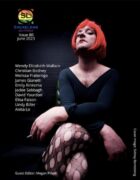You write great first lines. And I can say that because I found more of your work. When I read the first line of “Five Things,” I’ll be honest—I stopped right there and didn’t pick up the story again for a couple of days. How important are great first lines in short fiction! Tell me what your process is for crafting a great first line.
Thanks for taking the time to look up other stories! I usually don’t start writing a story until I have the first sentence—I’ll have an idea I’m working on in my head, and then over the next few months, I’ll chew on it until the right first sentence falls into place. I end up changing most of the draft over the next few months/years, but often the first sentence stays the same. For this story, I liked the distance that the first sentence establishes–and by repeating part of that first sentence in each of the five sections, I tried to keep it circling back to this distance, pulling the reader out of the water for a moment–until the last section, when the first sentence changes and doesn’t let the narrator keep the distance.
While this is certainly the protagonist’s story, it’s also Charlie’s story. Charlie seems like the type of character that we hear more about from others than from Charlie himself. Of course, when the story takes place, Charlie is gone. Tell us about the perspective from which you chose to tell this story—why the peripheral narration from an ex and not the father or Charlie himself?
I like the distance that this perspective provides—gives the narrator an almost scientific separation from the sadness that is too big to swim in for long. The narrator observes her memories with little emotion. While the story is about Charlie and his father for sure, it’s also about the narrator needing to grapple with the reality that she didn’t (couldn’t) stay, something both her ex and Charlie understood, but that maybe she hasn’t fully forgiven herself for. She chose to stop treading water with them–though it really just led to her treading water in a different bucket.
The “hope” experiment, woah. The extended metaphor here is done well. The father as the scientist, continuing to administer false hope to each of the other characters—I particularly appreciate the line, “I hadn’t heard your voice in almost two years and it entered my body like water.” However, the father seems to also to be holding on to hope throughout. How much of this is intentional and how much am I reading into it?
The hope experiment has bored itself into my brain since I read about it decades ago. I always knew it would end up somewhere in a story because it is just devastating to me. I’ve lost many nights of sleep picturing those rats treading water in buckets, believing that they just need to hang on a little longer. When you start to pay attention to it, you see people everywhere treading water like this, hoping for a reprieve. All of the characters in this story rely on hope to get them through (and rely on others to provide that hope) until it doesn’t anymore. Which ironically, cruelly, proves the power of hope, which is what that terrible experiment set out to do!
I took a risk in combining the hope experiment metaphor with the red things strategy and structure–but they stick together in my mind and I hope it works for readers. Charlie’s dad quietly prompts him to locate and name red items, and Charlie searches, trusting that the items will be there. It’s like an unspoken agreement to pretend things will be okay and then they can rest together for a few moments. They both know that this is only a reprieve, but they find comfort in that solid ground. In some ways, all the characters in my story are just searching for red things–and providing them for each other–trusting that the next one will be there and that the act of searching will get them through to the next reprieve.
If making readers burst into tears is what you were going for, you nailed it. And captured a moment—subtle and dramatic—perfectly. What do make of the use of emotion in writing and how it can play favorably or unfavorably in short fiction?
There is such a narrow line between emotionally effective and emotionally manipulative. To be honest, my drafts often start as the latter, and then it takes lots of cutting to get the story back to the right side of that line. When I am reading, I find myself most emotionally affected by what the author doesn’t say, the spaces they leave. I think Amy Hempel is a master of this—Hempel has this tiny little story called “Sing to It” that is just perfect; it’s sparse, choppy, repetitive, unemotional, and yet I can’t read it without crying. I strive for that level of craft.
Finally, a broad question about your life and work—what drives you to continue to write compelling short fiction?
I get dozens of little nuggets stuck in my brain—like the red things strategy and the hope experiment—and then they all just bang around unconsciously for years until something surfaces. I’m drawn to short fiction because you don’t have room to be sloppy or lazy or unintentional—every word has a purpose. It makes it really fun to write (and read!), which leads me to the main reason, probably, that I keep writing—and that’s reading. When I come across a short story that moves me, it’s magical—and it makes me want to tear apart the story to see how and why the author made this choice of word or that choice of structure. It’s pretty cool to think that maybe I could provide that for others.



 The core workshop of SmokeLong Fitness is all in writing, so you can take part from anywhere at anytime. We are excited about creating a supportive, consistent and structured environment for flash writers to work on their craft in a community. We are thrilled and proud to say that our workshop participants have won, placed, or been listed in every major flash competition. Community works.
The core workshop of SmokeLong Fitness is all in writing, so you can take part from anywhere at anytime. We are excited about creating a supportive, consistent and structured environment for flash writers to work on their craft in a community. We are thrilled and proud to say that our workshop participants have won, placed, or been listed in every major flash competition. Community works.